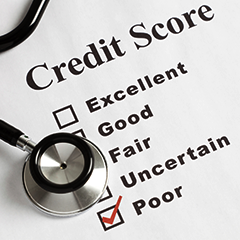Stay on Top of Your Business’s Credit Rating
March 7, 2014 | Business Plans, Financial Planning
 These days, anyone looking to form a new business relationship, especially one that involves credit, is wise to check out the risk involved first. After all, we know that even giant companies that once seemed untouchable may be teetering on too narrow a pedestal.
These days, anyone looking to form a new business relationship, especially one that involves credit, is wise to check out the risk involved first. After all, we know that even giant companies that once seemed untouchable may be teetering on too narrow a pedestal.
With that in mind, various parties might be checking out your Maine-based small business’ credit rating to determine whether they want to do business with you. That’s why, just as with your personal credit report, you need to be aware of what is in your business credit file.
If your company is in good standing, is free of legal hassles, and has a good reputation, your credit file has the power to work for you. A good business credit score can lead to lower financing costs on loans and credit cards, enable your business to qualify for better credit terms and in some cases even lower your insurance premiums.
Obviously, this also works in reverse. Negative information, even if it’s false, can leave your company with higher interest rates, lower credit limits, and elevated insurance premiums, plus a loss of revenue if customers decide not to take a chance doing business with you.
Does every business have a credit score?
No. Often a sole proprietor will pay business bills out of their personal checking account. Because of this, small businesses can be judged on the personal credit score of that owner. Business credit reporting agencies gather information from sources like the Yellow Pages, so there might be a bare bones record of the small business. And, if there are any recent legal judgments or pending lawsuits, these may show up and raise red flags for anyone who inquires about your business.
How do you find out if your company has a business credit file?
Pick up the phone, call Dunn and Bradstreet or Experian, or another agency that deals in business credit reporting, and ask. It’s that simple.
What factors are included in a business’ credit file?
Information in a business credit report is gleaned from a wide variety of public and private sources, including:
- The Yellow Pages and other print directories
- Contracts and loans connected to the federal government as well as people and companies you’ve done business with
- Corporate financial reports
- Legal filings
- Mining from internet sites
- The news media
Some credit agencies are also available to do direct investigation by request.
What if you discover that your business has a bad reputation?
Even if the negative information is inaccurate, it can keep others from doing business with you. Therefore, periodic monitoring of your credit score is vital. If you find inaccuracies, call the credit agency and give them the correct information. Negative entries that are more than two years old probably won’t show up on your business credit report.
Just as with personal credit, the most important thing is to pay bills on time. Make sure you’re not overextending your business commitments. Get, and keep, payments into the manageable category. If the problem is cash flow, get it under control by vetting credit customers more thoroughly. Use the same credit reporting agency that others use to check out your business when deciding whether or not to extend credit.
Remember, it only takes one inaccuracy to change the complexion of your credit history. So at a minimum, check your small business’ credit file once every quarter. Consult with Filler & Associates for more information about keeping your business credit file accurate.
